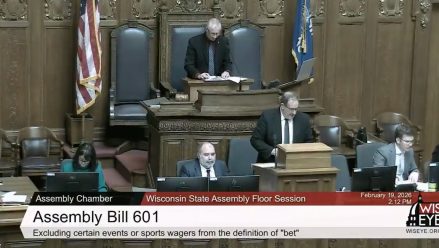FanDuel announced late Wednesday afternoon that it will partner with derivatives marketplace CME to create an “event contacts” platform, or prediction market, in the U.S.
Earlier Wednesday, news broke that DraftKings, PrizePicks, and Underdog have submitted applications to the National Futures Association (NFA), the first step toward offering prediction markets.
Per a FanDuel press release, the betting giant and CME plan to launch the platform “later this year” and it “will include benchmarks such as the S&P 500 and Nasdaq-100, prices of oil and gas, gold, cryptocurrencies, and key economic indicators such as GDP and CPI, with further details of additional offerings to be determined in the coming months.”
There is no mention of offering sports event contracts in the press release.
“Partnering with CME Group will unlock our ability to bring even more new and engaging products to FanDuel’s fast-growing customer base,” FanDuel CEO Amy Howe said in the press release. “We believe there is potentially a wide audience for trading event-based markets and we want to provide a platform that allows our customers to engage in this activity.
“We are excited to be partnering with CME Group to design new and engaging products, combining innovation with best-in-class regulatory compliance and consumer protections.”
Plenty of controversy
Prediction markets have been at the heart of a nationwide controversy with regard to contracts on sporting events. Since Kalshi began offering sports event contracts ahead of the Super Bowl, three states have attempted to enforce cease-and-desist letters demanding that Kalshi stop offering those products.
Kalshi responded by filing claims against the states of Maryland, Nevada, and New Jersey requesting injunctions against the letters.
So far, judges in New Jersey and Nevada have sided with Kalshi, and allowed the platform to continue to offer sports event contracts. A U.S. District Court judge in Maryland Aug. 1 denied Kalshi’s request. But Kalshi appealed to the Fourth Circuit Court of Appeals, and as both sides wait for its decision on whether to grant the injunction, Maryland’s attorney general said his office won’t enforce the cease-and-desist until the Fourth Circuit rules.
Kalshi has already partnered with Robinhood, which offers Kalshi event contracts, including those on sports. Beyond that, in July, rival prediction market PredictIt has regained entry to offer its contracts in the U.S., and Polymarket bought an exchange registered with the Commodity Futures Trading Commission, to gain access to the U.S. market. Polymarket currently operates outside the U.S.
Kalshi Monday self-certified to offer a host of new football-related options, including prop bets, ahead of the NFL and college seasons.
Why states oppose prediction markets
At issue for states is that Kalshi, and other prediction markets, are regulated by a federal agency, not the state. Since the Professional and Amateur Sports Protection Act (PASPA) was overturned in 2018, 41 U.S. jurisdictions have crafted comprehensive regulations around legal sports betting, but Kalshi argues that these do not apply to the business, as it is subject only to the jurisdiction of the federal Commodity Futures Trading Commission (CFTC).
In addition, federally regulated prediction markets don’t pay state taxes.
The states argue they are better suited and more experienced in regulating betting on sporting events, and that while prediction markets are technically financial products, consumers see them as wagering. Those consumers, the states say, will have fewer protections betting on sites regulated by a federal agency with no experience with gambling.
Indian tribes across the U.S. see prediction markets as a violation of their right to exclusivity for gaming on their lands, and in some cases, states that have granted them exclusivity. In June, a coalition of 34 attorneys general and an alliance of 65+ tribal entities filed amicus briefs backing the state of New Jersey.
The FanDuel-CME platform will be a “futures commission merchant” (FCM), which means that it will offer event contracts, but will not set the markets, like Kalshi, which is a “designated contract market” (DCM) will. The platform will offer customers the opportunity to purchase contacts based on yes-or-no questions with a starting wager of $1.







